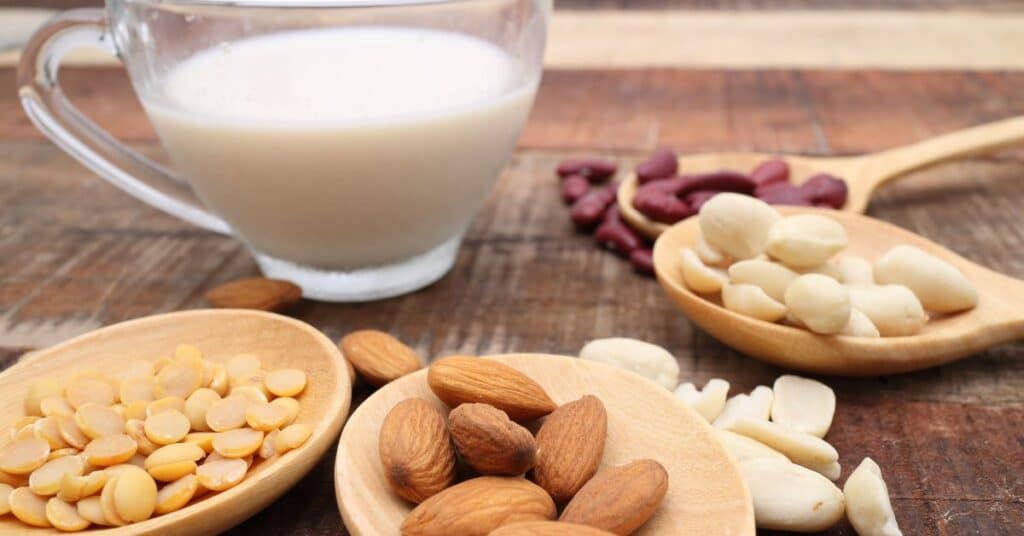Soy milk and almond milk are two of the most popular plant-based milk alternatives on the market. As you explore your options for dairy-free beverages, understanding the differences between these two can help you make an informed decision based on your dietary needs and preferences. Soy milk, made from soaking and grinding soybeans, has been a traditional drink in East Asia for centuries and has found a place in Western diets as a versatile and nutritious alternative to cow’s milk.

On the other hand, almond milk, which is produced by blending almonds with water and then straining the mixture to remove solids, offers a different set of benefits and a distinct, nutty flavor. It’s often sought after by those looking for a lower-calorie option that’s also dairy-free. While both soy and almond milk can be enriched with vitamins and minerals, such as calcium and vitamin D, they naturally offer different nutritional profiles, with soy milk being higher in protein and almond milk being lower in fat and calories. As you consider your choices, you’ll want to weigh these nutritional aspects along with other factors, such as taste, environmental impact, and how you plan to use them in your meals and beverages.
Benefits of Soy Milk vs Almond Milk
When you’re exploring plant-based milk alternatives, soy milk, and almond milk are popular options that you might consider. Both have their unique perks and can be delicious alternatives to cow’s milk, depending on your taste preferences and dietary needs.
Soy Milk:
- Protein Content: Soy milk is a rich source of protein, comparable to cow’s milk, making it a great choice for maintaining muscle health.
- Nutrient-Rich: Fortified soy milk provides essential nutrients such as calcium and vitamins A, D, and B12.
- Texture: It has a creamy texture, which can be a satisfying cow’s milk substitute in recipes and beverages.
- Flavor: The taste of soy milk is generally mild and creamy, pairing well with both sweet and savory dishes.
Almond Milk:
- Low Calories: Almond milk is usually lower in calories than soy milk, a good option if you’re watching your calorie intake.
- Heart Healthy: It’s often high in vitamin E and generally low in saturated fat, which can support heart health.
- Texture: It has a light and crisp texture, making it a refreshing choice on its own or in cold cereal and smoothies.
- Uses: Because of its subtle nutty flavor, almond milk can add a special touch to your coffee, tea, and some baked goods.
By choosing soy or almond milk, you’re not only opting for vegan milk options but also embracing the versatility and unique flavors these plant-based milk alternatives offer. They each have distinct culinary uses that can enhance your cooking and beverage-making adventures. Enjoy discovering which one complements your palate and suits your lifestyle the best!
Soy Milk vs Almond Milk for Weight Loss

Choosing between soy milk and almond milk can be crucial for your weight loss journey. Each has its unique profile that may align with your dietary goals.
Soy Milk
- Calories: Higher than almond milk but still lower than cow’s milk.
- Protein: Offers a considerable amount of protein, which can aid in satiety and muscle maintenance.
- Texture: Creamier texture, which might satisfy your craving for traditional cow’s milk.
- Uses: Versatile in cooking and baking due to its protein content and texture.
Almond Milk
- Calories: Generally lower in calories compared to soy and cow’s milk, making it a popular choice for calorie-restricted diets.
- Protein: Less protein than soy milk, which may not promote the same level of fullness.
- Texture: Often lighter and less creamy, but suitable for those who prefer a less rich mouthfeel.
- Uses: Works well in smoothies and cereals and as a dairy substitute in beverages due to its mild flavor.
When incorporating these vegan milk alternatives into your diet, consider the balance between taste, flavor, and texture preferences, as well as nutritional content. Both can be part of a weight loss plan if used mindfully. Remember to check for added sugars in flavored varieties, as they can counteract your weight loss efforts.
Soy Milk vs Almond Milk for Baking

When you’re baking and looking for an alternative to cow’s milk, both soy milk and almond milk are great plant-based options. Their different properties can affect the taste, flavor, and texture of your baked goods.
- Soy Milk:
- Creamier Texture: Soy milk’s rich and creamy texture makes it a closer match to cow’s milk in baking, which may be preferable for cakes and bread.
- Stronger Flavor: The naturally stronger taste of soy can slightly alter the final flavor of your dish.
- Curdling Potential: Less prone to curdling compared to almond milk, making it a safer bet in recipes that involve acidity.
- Almond Milk:
- Lighter Texture: Almond milk tends to be lighter and less creamy, which might be ideal for lighter pastries.
- Subtle Flavor: Offers a mild nutty flavor that can complement baked items without overpowering them.
- Varying Consistencies: Available in different thicknesses, you can choose according to your preference.
Remember, especially in vegan milk options, sweetened versions can add unexpected sweetness to your recipe, so you might want to opt for unsweetened varieties to have better control over the sweetness of your baked goods.
For either type of milk, consider the fat content as well. Higher-fat plant-based milks will bring you closer to the results typically achieved with cow’s milk.
Usage Tips:
- Use a 1:1 ratio when substituting cow’s milk with soy or almond milk.
- Adjust the sugar in your recipe if you are using a sweetened milk variant.
- For a richer texture, you can mix a little oil into almond milk.
Choose soy milk for a creamier texture or almond milk for a lighter touch in your baking adventures.
Soy Milk vs Almond Milk in Coffee

When choosing between soy and almond milk for your coffee, you’ll notice distinct differences.
Soy Milk:
- Taste & Texture: Soy milk often provides a mild, beany flavor. It’s commonly thicker than almond milk, giving it a creamier texture that mimics cow’s milk.
- Coffee Compatibility: It handles heat well and is less likely to curdle than almond milk, making it a reliable choice for hot brews.
- Frothing: When frothed, soy milk creates a decent foam suitable for lattes and cappuccinos.
Almond Milk:
- Taste & Texture: Almond milk has a lightly sweet, nutty flavor. It’s typically less creamy than soy milk, but many find this lighter texture desirable in coffee.
- Coffee Compatibility: Almond milk may sometimes separate when mixed with acidic coffee, especially if it’s hot.
- Frothing: It can froth, but it often produces a lighter foam than soy milk.
You might pick soy milk for a texture close to traditional cow’s milk or almond milk for a less creamy, subtly sweet taste. Both are vegan and fall under plant-based milk alternatives, making them popular among those seeking dairy-free options. Choosing between them can depend on your texture preference and how you like your coffee’s flavor to be complemented.
Frequently Asked Questions
What are the nutritional differences between soy milk and almond milk?
Soy milk is generally higher in protein, providing about 6 to 8 grams per 8-ounce serving, compared to almond milk’s 1 to 2 grams. Soy milk often has a more robust profile of vitamins and minerals, while almond milk typically has fewer calories and less fat.
Which milk alternative is best for weight loss: soy, almond, or another option?
For weight loss, almond milk may be favorable due to its lower calorie count compared to soy milk. However, the high protein content in soy milk can help keep you feeling full, which might help with weight management. It’s essential to choose unsweetened versions regardless of the type to minimize added sugars.
What are the taste differences between soy milk and almond milk?
Soy milk has a creamier, thicker texture and a slightly beany taste, which might be more similar to dairy milk. Almond milk is typically lighter and has a mildly sweet, nutty flavor. Your preference might depend on whether you like a richer or more refreshing drink.
Are there any health concerns associated with drinking soy milk?
Moderate consumption of soy milk is generally safe for most people. However, it contains phytoestrogens, which can mimic estrogen in the body, though research indicates this doesn’t pose a risk for most people. Those with thyroid conditions or allergies to soy should avoid soy milk.
What are some of the benefits of choosing non-dairy milk such as soy or almond over traditional cow’s milk?
Non-dairy milk like soy and almond can be beneficial for those with lactose intolerance or milk allergies as they are lactose-free. They can also have a lower environmental impact compared to cow’s milk and are suitable for vegan diets. Additionally, they are often fortified with calcium and vitamin D.
